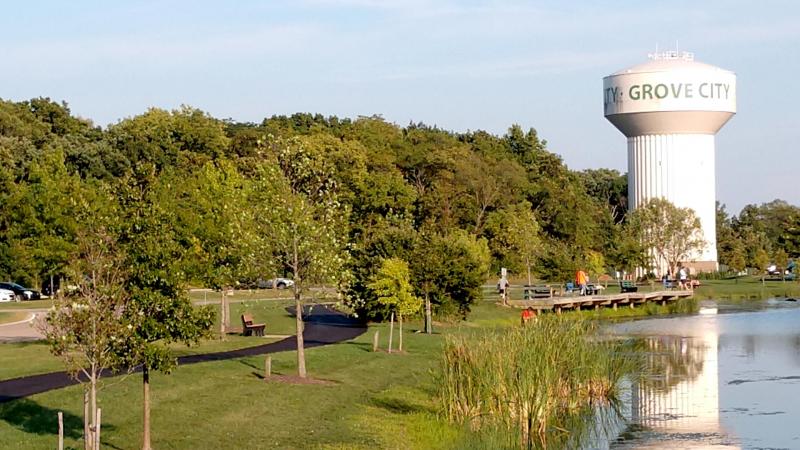Planning Students Win 2021 APA Student Project Award for Excellence
View a PDF of Grove City Sustainability Plan
City and Regional Planning students from the Knowlton School won the 2021 Student Project Award for Excellence from the American Planning Association’s (APA) Sustainable Communities Division. Sustainable Grove City, a comprehensive plan to promote resiliency and sustainability in Grove City, Ohio, was developed by students participating in the planning section’s Sustainability Studio.
Students in the planning seminar who were recognized include Abby Anacki, Taylor Axene, Annalise Bennett, Dan Blanchard, Amber Boyd, Alan Clinton, Allison DeLong, Thomas Graham, Maeve Hogel, Xiaoya Ji, Derek Miller, Jalen Miller, Elise Schellin, and Justin Scott.

Under the guidance of Associate Professor of Practice Kimberly Burton, P.E., AICP CTP, LEED AP ND, students collaborated with the Grove City Environmental Sustainability Committee to design actions and objectives for the plan with input from the public. The plan's goal is to guide Grove City’s efforts to ensure a more environmentally conscious and prosperous community that promotes green practices for residents and businesses.
The Sustainable Grove City plan details more than 30 sustainability actions—which include projects, policies, and programs—that have been organized into seven categories: built environment, natural environment, energy, transportation, waste reduction, business practices, and city operations. In addition to actionable items, each of the seven main topic sections explores examples from peer cities and includes an implementation timeline. The plan concludes with a comprehensive implementation matrix that outlines each action item with an incremental timeline for implementation, metrics to measure the success of the implementation, and responsible parties.
In addition to the seven categories, the plan outlines three cross-cutting themes: health and safety, equity, and community engagement. The cross-cutting themes connect to all of the seven categories and to the action items within each category. The plan promotes enhancing infrastructure within the built environment, promoting healthier modes of transportation, using energy-efficient technology, and the active preservation of natural resources as opportunities to influence public health and safety. Further incorporated in many of the plan’s equity-specific action items are the consideration and inclusion of environmental justice principles and standards. Finally, the plan singles out engagement through city events, educational programs, and community forums to bring meaning and relevance to sustainability goals across a broad spectrum of players and to encourage local innovations in sustainable development through creative problem-solving.
Among other action items, the Sustainable Grove City Plan recommends that the city
- create educational community workshops on sustainability.
- remove regulatory and permitting barriers for Low Impact Development practices.
- remove regulatory and permitting barriers for Green Infrastructure (GI) and practices.
- create community gardens to engage residents and encourage locally grown foods.
- commit to City Operations utilizing 100% emission-free sourced electricity.
- create Complete Street Design Guidelines.
- identify barriers to multi-modal and active transportation to overcome transportation barriers.
- develop an educational campaign encouraging proper recycling.
- transition City Fleet to Electric Vehicles.


